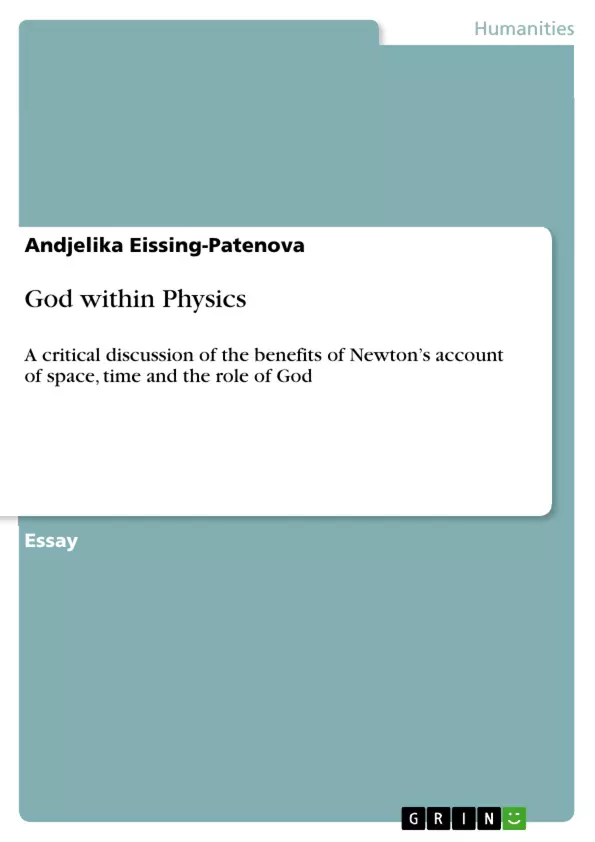In his Philosophae Naturalis Principia Mathematica (1687), Isaac Newton developed a revolutionary account of space, time, place and motion which consists of fundamentally different ideas in contrast to the previously held views of how the universe could look like. By including God in his theory, he links metaphysical questions to physics and thus explains in which sense God can be seen as a part of natural philosophy. (Janiak 2008: 163) In this paper, I argue for the claim that Newton’s account of the role of God is convincing. In section II, I will provide an overview of Newton’s ideas about space and time and especially the role of God within this system1. In the course of this overview, I will justify my claim by discussing the benefits Newton’s concept of God is able to deliver. In the conclusion, I will briefly summarize the results.
Table of Contents
- I. INTRODUCTION
- II. NEWTON ON SPACE, TIME AND GOD
- III. CONCLUSION
Objectives and Key Themes
This paper aims to argue for the convincing nature of Newton's account of God's role in his theory of space, time, and motion. It does so by examining the benefits of including God within a physical theory.
- Newton's concepts of absolute space and time
- The nature and role of God in Newton's system
- The benefits and implications of incorporating God into natural philosophy
- The pragmatic advantages of Newton's theological framework
- The limitations of empirical investigation in assessing the role of God
Chapter Summaries
I. INTRODUCTION: This introductory chapter sets the stage for the paper's central argument: that Newton's inclusion of God in his account of space, time, and motion is convincing. It briefly introduces Newton's revolutionary ideas, contrasting them with previous views and highlighting the link between metaphysics and physics within Newton's framework. The chapter outlines the paper's structure, promising to provide an overview of Newton's ideas and justify the main claim through a discussion of the benefits of Newton's concept of God.
II. NEWTON ON SPACE, TIME AND GOD: This chapter delves into the core of Newton's theory, explaining his concepts of absolute space and time as distinct and independent entities. It contrasts this with the prior understanding of space and time as relative to physical substances. The chapter introduces Newton's conception of God as a necessary, infinite, and omnipotent substance, distinct from other substances yet fundamentally connected to them as the cause of their existence within absolute space and time. The chapter emphasizes that Newton's attribution of physical characteristics to God, while daring for the time, avoided undermining God's essential attributes. The pragmatic benefits are explored, highlighting how God's role provides a satisfying answer to the human need for an ultimate first cause and how the concept of a physical, acting God is readily comprehensible to humans.
Keywords
Newton, space, time, God, absolute space, absolute time, natural philosophy, metaphysics, physics, first cause, causation, empirical investigation, theology, scientific knowledge.
Newton on Space, Time, and God: FAQ
What is the main argument of this paper?
The paper argues that Newton's inclusion of God in his theory of space, time, and motion is convincing. It supports this by examining the benefits of including God within a physical theory.
What are the key themes explored in this paper?
Key themes include Newton's concepts of absolute space and time; the nature and role of God in Newton's system; the benefits and implications of incorporating God into natural philosophy; the pragmatic advantages of Newton's theological framework; and the limitations of empirical investigation in assessing the role of God.
What are the chapter summaries?
Chapter I: Introduction sets the stage, introducing Newton's revolutionary ideas and outlining the paper's structure. Chapter II: Newton on Space, Time, and God delves into the core of Newton's theory, explaining his concepts of absolute space and time and his conception of God as a necessary, infinite, and omnipotent substance.
What is Newton's concept of absolute space and time?
Newton's theory posits absolute space and time as distinct and independent entities, contrasting with previous understandings that viewed space and time as relative to physical substances.
What is Newton's conception of God's role in his system?
Newton views God as a necessary, infinite, and omnipotent substance, distinct from other substances yet fundamentally connected to them as the cause of their existence within absolute space and time. This physical, acting God provides a satisfying answer to the need for an ultimate first cause and is readily comprehensible to humans.
What are the benefits of incorporating God into Newton's natural philosophy?
The paper explores the pragmatic benefits of Newton's theological framework, highlighting how God's role provides a satisfying answer to the human need for an ultimate first cause and how the concept of a physical, acting God is readily comprehensible to humans. It also implicitly suggests the limitations of purely empirical investigations in understanding ultimate causes.
What are the keywords associated with this paper?
Newton, space, time, God, absolute space, absolute time, natural philosophy, metaphysics, physics, first cause, causation, empirical investigation, theology, scientific knowledge.
What is the overall structure of the paper?
The paper consists of an introduction, a main chapter focusing on Newton's views on space, time, and God, and a conclusion (though the provided preview doesn't detail the conclusion).
What type of analysis is presented in this paper?
The analysis presented is a structured and professional examination of the themes of Newton's work, aiming to argue for the convincing nature of Newton's inclusion of God within his physical theory.
- Quote paper
- Andjelika Eissing-Patenova (Author), 2019, God within Physics, Munich, GRIN Verlag, https://www.grin.com/document/503370



